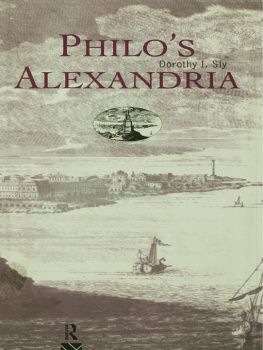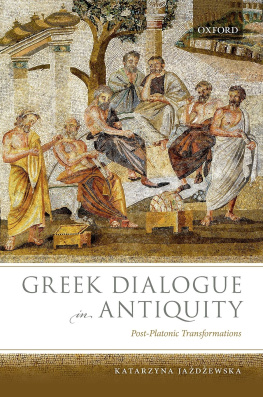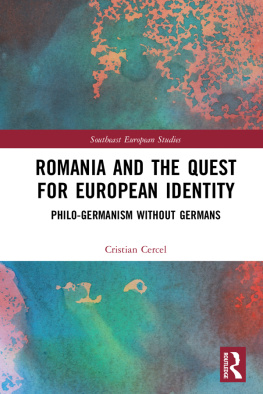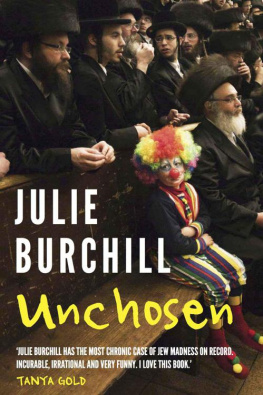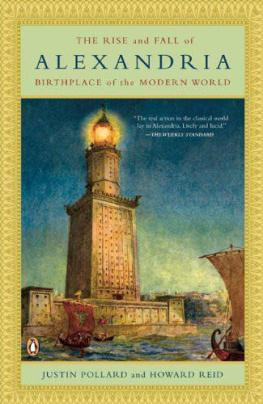Philo of Alexandria
THE ANCHOR YALE BIBLE REFERENCE LIBRARY is a project of international and interfaith scope in which Protestant, Catholic, and Jewish scholars from many countries contribute individual volumes. The project is not sponsored by any ecclesiastical organization and is not intended to reflect any particular theological doctrine.
The series is committed to producing volumes in the tradition established half a century ago by the founders of the Anchor Bible, William Foxwell Albright and David Noel Freedman. It aims to present the best contemporary scholarship in a way that is accessible not only to scholars but also to the educated nonspecialist. It is committed to work of sound philological and historical scholarship, supplemented by insight from modern methods, such as sociological and literary criticism.
John J. Collins
General Editor
THE ANCHOR YALE BIBLE REFERENCE LIBRARY
Philo of Alexandria
An Intellectual Biography
MAREN R. NIEHOFF

Yale UNIVERSITY PRESS
NEW HAVEN AND LONDON
Anchor Yale Bible and the Anchor Yale logo are registered trademarks of Yale University.
Copyright 2018 by Yale University. All rights reserved.
This book may not be reproduced, in whole or in part, including illustrations, in any form (beyond that copying permitted by Sections 107 and 108 of the U.S. Copyright Law and except by reviewers for the public press), without written permission from the publishers.
Yale University Press books may be purchased in quantity for educational, business, or promotional use. For information, please e-mail (U.K. office).
Set in Adobe Caslon type with Bauer Bodoni display by Newgen
North America.
Printed in the United States of America.
Library of Congress Control Number: 2017940024
ISBN 978-0-300-17523-3 (hardcover : alk. paper)
A catalogue record for this book is available from the British Library.
This paper meets the requirements of ANSI/NISO Z39.48-1992 (Permanence of Paper).
10 9 8 7 6 5 4 3 2 1
For my parents, Ulla and Gerd Niehoff,
my husband, Udi Rosenthal,
and my daughters, Maya, Ayana, and Stav,
with much love and gratitude
In memory of
Tamar Rosenthal, my mother-in-law,
who welcomed me warmly into the family and encouraged my work
Contents
Acknowledgments
This book had its beginning at a conversation with John Collins after I gave a lecture at Yale University in 2010. At that time the idea of writing an intellectual biography of Philo was still rather vague, and I am grateful to John for encouraging and accompanying me with singular grace and prudence. John also edited the manuscript, offering invaluable comments. Heather Gold and her team at Yale University Press promoted the production with remarkable efficiency and professionalism, rendering the preparation of the book a real pleasure. Special thanks to Jessie Dolch for her meticulous copy-editing, always in an enthusiastic spirit, and to Mary Pasti.
I have been accompanied on this journey by old and new friends who encouraged me and significantly contributed to this book. Margalit Finkelberg read all the chapters and the revised versions of some chapters with a rare combination of empathy, wisdom, and criticism. Yehuda Liebes offered insightful comments on several chapters and read with me Philos tractate On the Migration of Abraham, thus enriching my understanding of his exegesis. Miriam Griffin read all the Roman chapters with utmost care and provided numerous precious comments. Ren Bloch, Albert Harill, Adele Yarbo Collins, and Tim Whitmarsh offered helpful comments on individual chapters. Two anonymous readers for Yale University Press offered constructive comments that considerably improved the final version of the manuscript. More generally, I thank Judith Green for hosting and guiding a reading group in Greek literature that covered, during the gestation of the book, Aureliuss Meditations and Philostratuss Life of Apollonius.
My work on the book has tremendously benefited from discussions following lectures. I recall with special gratitude the invitation by Peter Schfer to Princeton (2008), by Carlos Lvy and Philippe Hoffman to Paris (2010), by Steven Fraade to Yale (2010), by Francesca Calabi to Milan (2011), by Teresa Morgan to Oxford (2013), by Richard Faber and Achim Lichtenberger to Bochum (2013), by Hindy Najman to Yale (2014), by Laura Nasrallah and Shaye Cohen to Harvard (2014), by Jrg Rpke and Eve-Marie Becker to Erfurt (2015), by Hermut Lhr to Mnster (2015), by Winrich Lhr to Heidelberg (2016), and by Ciliers Breytenbach to Berlin (2016). I have also benefited from the astute questions of my students, in both the Department of Jewish Thought and the Amirim Honors Program in the Humanities at the Hebrew University of Jerusalem.
The research for this book was generously supported by the ISRAEL SCIENCE FOUNDATION (grant no. 186/11) and a grant from the Niedersachsen-Israeli Research Cooperation Program (together with Reinhard Feldmeier). Rami Schwartz helped me acquire literature and compile the bibliography. Tom Sela prepared the index. Both foundations also supported an inter national conference in Jerusalem, Journeys in the Roman East: Imagined and Real, that illuminated the wider context of Philos journey to Rome (ISRAEL SCIENCE FOUNDATION grant no. 2178/15). My sabbatical leave from the Hebrew University in 20132014, which I spent in Jerusalem, provided precious time to engage in undistracted work.
Thanks to Rina Talgam, my colleague in the Department of Art History, for suggesting the cover image, which is taken from the Ara Pacis Augustae, an altar Augustus consecrated in Rome. The southern wall of the altar depicts several groups from the imperial family, including the detail on the cover, which most likely presents the prince Drusus in conversation with his wife, Antonia. This scene expresses Augustuss ideal of the Roman couple as well as the status of the mother and wife in Roman culture. When Philo visited Rome as an ambassador, he probably saw this altar and perhaps even appreciated this particular scene. He certainly adopted the Augustan ideal of marital union. It is thus more than appropriate that this image should decorate his biography. Thanks also to Roi Sabar from the Archeology Department for providing a high-quality photograph.
The book is based on some materials that have been previously published and substantially revised. contains a passage based on the article The Symposium of Philos Therapeutae: Displaying Jewish Identity in an Increasingly Roman World, Greek, Roman, and Byzantine Studies 50 (2010): 95117. I thank all the editors for their kind permission to reuse the materials in this book.
This book is dedicated to my family. My parents have followed my work with great interest, making valiant efforts to get to know the Jewish tradition. My husband, Udi, has enthusiastically supported my work, even during times of physical ailment, and provided a most loving anchor to my life. My daughters have in the meantime grown up and become wonderful conversation partners, mostly on topics unconnected to Philo.
An Intellectual Biography of Philo?
No biography of Philo has ever been attempted, and there are good reasons for this state of affairs. Philo resists the easy grasp of a biographer because he tells us very little about his own person and virtually nothing about the circumstances of his writing activity. Vital facts, such as his upbringing in Alexandria and the sequence of his works, can therefore be only conjectured. The Jewish historian Josephus Flavius, who lived just one generation after Philo and preserved much precious information about other characters, is disappointingly brief about him. His notice merely confirms that Philo was the head of the Jewish embassy to Gaius and that he was not inexperienced in philosophy. Christian authors began to mention Philo only later and then usually quoted or paraphrased his writings without providing additional information. The first author who offers an overall analysis of Philos work is the church historian Eusebius (ca. 260ca. 340 CE), who relies on a close reading of his texts, most of which are still extant. While Eusebiuss interpretation is remarkable and still relevant, it does not provide any additional evidence that could help us reconstruct Philos life.
Next page

